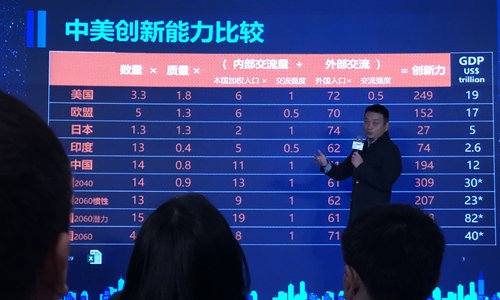

Low fertility rate set to impact economy more than aging

Liang Jianzhang, chairman and CEO of Ctrip, gives a report at the forum held on Wednesday. Photo: Zhang Hongpei/GT
It is urgent for China to put the brakes on its falling population via inspiring measures to boost fertility rates and conduct related reforms. Otherwise, the demographic trend will shut China out of the ranks of high-income countries and drag down the country's innovation power, industry analysts warned.
Figures released by the National Bureau of Statistics (NBS) on Monday showed a decline in domestic births of 2 million for 2018 to a total of 15.23 million, the lowest level since 1961.
"However, the level is also the highest expected in the next 100 years. By 2027, domestic newborns are estimated to fall below 10 million, equal to the level in the middle of China's Qing Dynasty (1636-1912)," Huang Wenzheng, a demographics expert, told a forum focused on discussions of China's population reduction on Wednesday.
China's crude birth rate stood at 10.94 per thousand, compared with 12.43 per thousand in 2017, data from the NBS showed.
Along with the continued decrease in population growth, the number of Chinese citizens aged 60 or above increased by 8.59 million in 2018, according to the NBS.
"We were too optimistic about China's fertility rate," said Huang. According to a survey in 2017, in China's urban areas, the fertility rate - measured by women's willingness to give birth - is around 1.46. In the rural areas, it is 1.91, even less than the rates in Japan and South Korea, both of which exceed 2.
High opportunity costs, soaring educational burdens and home prices in China are the "three mountains" facing women and their families, weakening their willingness to give birth and leading to the world's lowest fertility rate, said Liang Jianzhang, chairman and CEO of Ctrip, China's leading online travel agency, who is also an economic professor.
The fertility rate has become a key factor in deciding the demographic trend. "Compared with the impact of aging, a low fertility rate has much more of a negative effect on economic growth," said Huang.
"Once population growth turns negative, it is impossible to reverse the decline. It's not like an economic rebound," he said, adding that a fall in the population won't enhance GDP per capita. In the long term, it will lead to sluggish GDP growth.
The book The Demographics of Innovation, jointly written by Huang and Liang, was launched during the forum on Wednesday. It pointed out that China's population will start to shrink within the next decade and continue to decline thereafter.
Unless China's fertility rate can be lifted to around the replacement level - around 2.2births per woman in China - to keep the population growing, the trend of reduction will continue, according to the book.
Liang told the forum that a population crisis usually has a latency period of 20 years or more. Projecting to the year 2060, if proper demographic policies are implemented in time, China's GDP is forecast to reach $82 trillion, but if no policies are rolled out to reverse the demographic trends, the figure may be only $23 trillion by that year.
Concerns have risen lately that China may follow in the steps of Japan in walking into a population crisis and stagnant economic growth. Experts said that in the near and medium term, China's economic prospects are still very optimistic. However, it is high time for China to pay attention to the long-term trend.
"Lifting all birth controls and rolling out stimulus measures, including providing financial support for families with newborns and free nurseries or kindergartens, will not help much in increasing births," Huang told the Global Times during the forum. "But these steps must be taken despite the limited effects. That's the big picture," he said.
Zhou Tianyong, an economics professor at the Party School of the Communist Party of China Central Committee, told the Global Times on the sidelines of the forum that it is more significant for the country to conduct related reforms to alleviate the population pressure including reforms in land and tax revenues.
 Fire brigade in Shanghai holds group wedding
Fire brigade in Shanghai holds group wedding Tourists enjoy ice sculptures in Datan Town, north China
Tourists enjoy ice sculptures in Datan Town, north China Sunset scenery of Dayan Pagoda in Xi'an
Sunset scenery of Dayan Pagoda in Xi'an Tourists have fun at scenic spot in Nanlong Town, NW China
Tourists have fun at scenic spot in Nanlong Town, NW China Harbin attracts tourists by making best use of ice in winter
Harbin attracts tourists by making best use of ice in winter In pics: FIS Alpine Ski Women's World Cup Slalom
In pics: FIS Alpine Ski Women's World Cup Slalom Black-necked cranes rest at reservoir in Lhunzhub County, Lhasa
Black-necked cranes rest at reservoir in Lhunzhub County, Lhasa China's FAST telescope will be available to foreign scientists in April
China's FAST telescope will be available to foreign scientists in April "She power" plays indispensable role in poverty alleviation
"She power" plays indispensable role in poverty alleviation Top 10 world news events of People's Daily in 2020
Top 10 world news events of People's Daily in 2020 Top 10 China news events of People's Daily in 2020
Top 10 China news events of People's Daily in 2020 Top 10 media buzzwords of 2020
Top 10 media buzzwords of 2020 Year-ender:10 major tourism stories of 2020
Year-ender:10 major tourism stories of 2020 No interference in Venezuelan issues
No interference in Venezuelan issues
 Biz prepares for trade spat
Biz prepares for trade spat
 Broadcasting Continent
Broadcasting Continent Australia wins Chinese CEOs as US loses
Australia wins Chinese CEOs as US loses